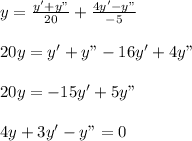Solution:
The given differential equation is,
 ------(A)
------(A)
Differentiating once,with respect to x,
 -------(1)
-------(1)
Differentiating again with respect to x,
 -------(2)
-------(2)
Equation (1) + Equation (2)
y' +y"


4 ×Equation (1) - Equation (2)
4 y'- y"


Substituting the value of
 in A,we get
in A,we get

As, y(0)=1 , and y'(0)=2, gives

gives ,

So, member of the family that is a solution of the initial-value problem,
 is
is
